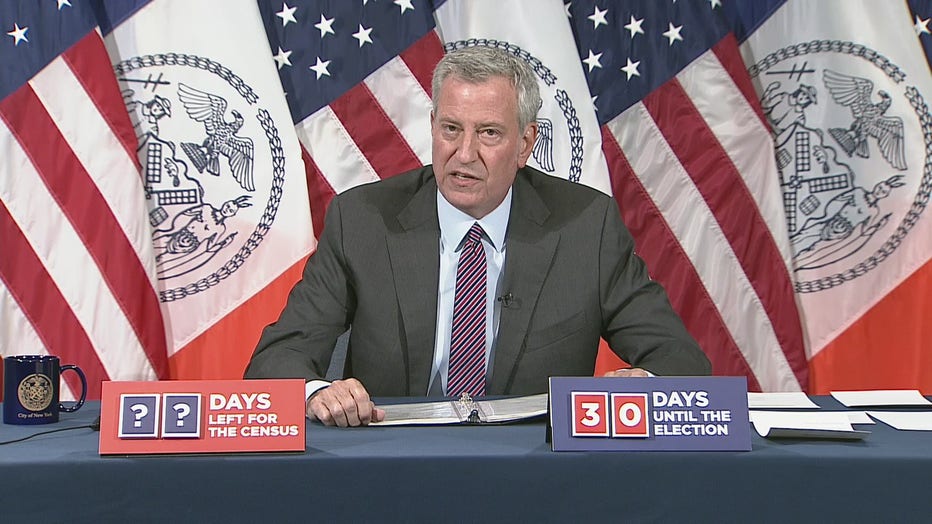NYC seeks to reinstate virus restrictions in some spots
NEW YORK - New York City's mayor said Sunday that he has asked the state for permission to close schools and reinstate restrictions on nonessential businesses in several neighborhoods because of a resurgence of the coronavirus.

Mayor Bill de Blasio holds a press conference on coronavirus rates in New York City.
The action, if approved, would mark a disheartening retreat for a city that enjoyed a summer with less spread of the virus than most other parts of the country, and had only recently celebrated the return of students citywide to in-person learning in classrooms.
Shutdowns would happen starting Wednesday in nine ZIP codes in the city, Mayor Bill de Blasio said.
About 100 public schools and 200 private schools would have to close. Indoor dining, which just resumed a few days ago, would be suspended. Outdoor restaurant dining would shut down in the affected neighborhoods as well, and gyms would close.
Houses of worship would be allowed to remain open with existing restrictions in place, de Blasio said.
The mayor, a Democrat, said he was taking the action in an attempt to stop the virus from spreading deeper into the city and becoming a “second wave,” like the one that killed more than 24,000 New Yorkers in the spring.
“We’ve learned over and over from this disease that it is important to act aggressively, and when the data tells us it’s time for even the toughest and most rigorous actions we follow the data, we follow the science,” de Blasio said.
Over the past two weeks, the number of new cases of the virus has been rising in pockets of the city, predominantly in neighborhoods in Brooklyn and Queens that are home to the city's large Orthodox Jewish population.
Nearly 1,100 people have tested positive in Brooklyn in just the last four days, according to state figures.
De Blasio made the announcement shortly after Gov. Andrew Cuomo complained that local governments with coronavirus hot spots had “not done an effective job” of enforcing social distancing rules.
“If a local jurisdiction cannot or will not perform effective enforcement of violating entities, notify the state and we will close all business activity in the hot spots where the local governments cannot do compliance,” Cuomo said.
Cuomo did not immediately comment on de Blasio's proposed shutdown in the areas where the virus is spiking.
As many as 500,000 people live in the neighborhoods affected by the proposed shutdown, de Blasio said. He said the lockdown could be lifted in 14 days or 28 days if the percentage of people testing positive for COVID-19 declines.
The coronavirus was estimated to have hit between 1 and 2 million people in New York City, mostly in the spring before testing was widely available. Thousands of people fell ill each day. By the summer’s end, the city appeared to have the virus partly in check, averaging fewer than 240 new cases per day citywide as recently as Sept. 7.
Overall, the city’s infection rate remains relatively low, with around 420 new cases a day over the past few days, but those have been concentrated in a handful of neighborhoods. The nine ZIP codes singled out by the mayor have been responsible for more than 20% of all new infections in the city over the past four weeks, though they represent only 7% of the population.
De Blasio had said in the past that public schools were largely unaffected by the rise in virus infections in Orthodox Jewish neighborhoods, but he said Sunday that public schools in the hot spot neighborhoods would be closed “out of an abundance of caution.”
United Federation of Teachers President Michael Mulgrew praised the decision. “This is the right decision, one that helps protect our schools, our neighborhoods, and ultimately our city," Mulgrew said Sunday.
The staff at Public School 164 in the Borough Park section of Brooklyn, one of the affected neighborhoods, sent a letter to de Blasio on Thursday demanding that the school be closed.
Teacher Frances Hidalgo said it was unrealistic to think the school would be immune from infection when students and staff interact with people in the neighborhood daily.
Hidalgo, a fourth grade teacher, pointed to the high positivity rate in Borough Park. “We don’t live in a bubble. We’re part of the neighborhood," she said in a phone interview Saturday.
Cuomo allowed New York City restaurants to resume indoor dining starting on Sept. 30, but at only 25% of their seating capacity. Several friends in the restaurant business said Sunday that shutting down for a while might be better.
FREE DOWNLOAD: Get breaking news alerts in the FOX6 News app for iOS or Android
“It's going to be a hard winter,” said Alejandra Benitez, who owns Beco Bar in a Brooklyn ZIP code affected by de Blasio's shutdown proposal. “But it's almost cheaper to close. It's just that people don't want to risk it.”
Mike Sternfield, who was dining with Benitez and other friends outside L&B Spumoni Gardens in Brooklyn, agreed with her. "As a bartender, I don't think we should be going inside to eat and drink at all,” Sternfield said. “But operating at 25% capacity isn't going to help anyone anyway.”
Related
Campaign says Joe Biden tests negative for coronavirus
Joe Biden’s campaign says the Democratic presidential nominee tested negative for coronavirus.
Related
Italy considers mask mandate for outdoors amid COVID-19 increase
The Italian government is weighing whether to require masks outdoors nationwide amid a steady increase in coronavirus infections.



